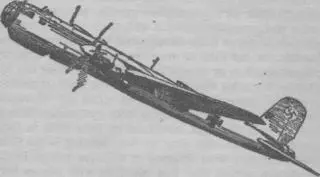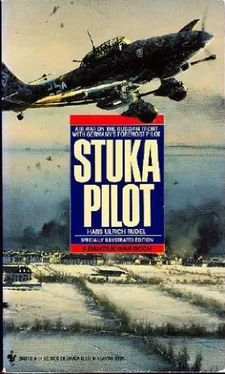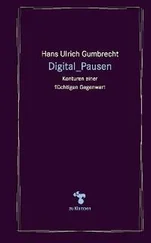It is a dreadful thing to be flying and fighting above our homes, the more so when one sees what masses of men and material are pouring into our country like a flood. We are no more than a boulder, a small obstruction but unable to stem the tide. The devil is now gambling for Germany, for all Europe. Invaluable forces are bleeding to death, the last bastion of the world is crumbling under the assault of Red Asia. Of an evening we are more exhausted by this realization than by the incessant operations of the day. Stubborn refusal to accept this fate and the determination that “this must not happen” keep us going. I would not like to have to reproach myself for having failed to do everything within my power till the eleventh hour to stave off the appalling, menacing spectre of defeat. I know that every decent young German thinks as I do.
South of our sector the situation looks very grim. Frankfurt-on-the-Oder is threatened. So overnight we get the order to move to Fürstenwalde which brings us nearer to the critical sector. A few hours later we are flying in the operation area Frankfurt—Küstrin. The spearheads of the Soviet advance have reached the Oder on the outskirts of Frankfurt. Further north Küstrin is encircled and the enemy is wasting no time in his efforts to establish a bridgehead at Göritz-Reitwein on the west bank across the frozen river.
One day, like the Prussian cavalry general Ziethen three hundred years ago, we are in battle east of Frankfurt above historic soil. Here a small German force has been surrounded by Soviet tanks. We attack them and those tanks which have not immediately caught fire try to escape across the open country. We come in at them time and again. Our comrades on the ground who had already given themselves up as lost leap for joy, throwing their rifles and steel helmets into the air and heedless of over pursue the fleeing tanks. Our fire put every one of them out of action. We in the air have for once the exhilaration of witnessing our success. After all the tanks have been captured I prepare a container and scribble a message of congratulations to our comrades from the Wing and me. I circle round very low and drop the container with some chocolate at their feet. The sight of their grateful, happy faces will steel us for the difficult operations ahead of us and spur us on to fresh, unremitting efforts to relieve our brothers-in-arms.
Unluckily the first days of February are very cold; at many places the Oder is frozen so hard that the Russians are able to cross the river. For stability they lay planks on the ice and I often see vehicles driving over them. The ice does not seem to be strong enough yet to bear the weight of tanks. As the Oder front is still in flux and there are gaps in the line where there is not one German soldier to oppose them, the Soviets are successful in establishing several bridgeheads, one, for example, at Reitwein. Our Panzer forces which are brought up too late arrive to find a strong enemy already lodged with heavy artillery on the west bank of the Oder. His crossing places are powerfully protected by flak from the first day. Ivan is accurately informed of our presence in this sector. My orders are to destroy all bridges day after day so as to delay the enemy and to give us time to bring up reinforcements and material from the rear. I report that at the moment this is more or less pointless, because it is possible to cross the Oder almost anywhere. The bombs crash through the ice, leaving relatively small holes, and this is the sum total of our achievement. I am, for attacking only recognized enemy targets on both sides of the river or the traffic crossing it, but not the so-called bridges of which in point of fact there are none. What look like bridges on aerial photographs are really the tracks of feet and vehicles on the ice; these and the planks laid between them to simulate bridges. If we bomb these tracks Ivan simply crosses the ice to the side of them. This is clear to me from the very first day because I have flown over them at low level countless times and, besides, this trick is nothing new to me, I know it from the Don, the Donetz, the Dniester and other Russian rivers.
So disregarding the order I concentrate my attacks on genuine targets on either bank: tanks, vehicles and artillery. One day a general sent from Berlin turns up and tells me that reconnaissance photographs always show new bridges.
“But,” he says, “you do not report that these bridges have been destroyed. You must keep on attacking them.”
“By and large,” I explain to him, “they are not bridges at all,” and when I see him contort his face into a question mark an idea occurs to me. I tell him that I am just about to take off, I invite him to sit behind me and promise to give him practical proof of this. He hesitates for a moment, then observing the curious glances of my junior officers who have heard my proposition with some glee, he agrees. I have given the unit a standing order to attack the bridgehead, I myself approach the objective at the same low level and fly from Schwedt to Frankfurt-on-the-Oder. At some points we encounter quite respectable flak and the general soon admits that he has now seen for himself that the bridges are in fact tracks. He has seen enough. After landing he is as pleased as Punch that he has been able to convince himself and can make his report accordingly. We are quit of our daily bridge chore. One night Minister Speer brings me a new assignment from the Führer. I am to formulate a plan for its execution. Briefly, he tells me:
“The Führer is planning attacks on the dams of the armament industry in. the Urals. He expects to disrupt the enemy’s arms production, especially of tanks, for a year. This year will then give us the chance of exploiting the respite decisively. You are to organize the operation, but you are not to fly yourself, the Führer repeated this expressly.”
I point out to the minister that there must surely be some one better qualified for this task, namely in Long Distance Bomber Command, who will be far more conversant with such things as astronomical navigation, etc. than I am who have been trained in dive-bombing and therefore have quite a different kind of knowledge and experience. Furthermore, I must be allowed to fly myself if I am to have an untroubled mind when briefing my crews.
“The Führer wishes you to do it,” objects Speer.
I raise some fundamental technical questions regarding the type of aircraft and the kind of bombs with which this operation is to be carried out. If it is to be done soon only the Heinkel 177 comes into consideration, though it is not absolutely certain that it will prove suitable for this purpose. The only possible bomb for such a target is, in my opinion, a sort of torpedo, but that too has yet to be tested. I flatly refuse to listen to his suggestion to use 2000 lb. bombs; I am positive that no success can be achieved with them. I show the Minister photographs taken in the Northern sector of the Eastern Front where I dropped two thousand pounders on the concrete pillars of the Neva bridge and it did not collapse. This problem must therefore be resolved and also the question of my being allowed to accompany the mission. These are my stipulations should the Führer insist on my undertaking the task. He already knows my objections that my practical experience is confined to a totally different field.

He. 177
Now I take up the file of photographs of the factories in question and study them with interest. I see that a high percentage of them are already underground and are therefore partly unassailable from the air. The photographs show the dam and the power station and some of the factory buildings; they have been taken during the war. How can this have been done? I think back to my time in the Crimea and put two and two together. When I was stationed at Sarabus and keeping myself fit by a little putting the weight and discus throwing after operations a black-painted aircraft often used to land on the airfield, and very mysteriously passengers alighted. One day one of the crew told me under the seal of secrecy what was going on. This air craft carried Russian priests from the freedom-loving states of the Caucasus who volunteered for important missions for the German command. With flowing beards and dressed in clerical garb each of them carried a little packet on his chest, either a camera or explosives according to the nature of his mission. These priests regarded a German victory as the only chance of regaining their independence and with it their religious liberty. They were fanatical enemies of world Bolshevism and consequently our allies. I can still see them: often men with snow white hair and noble features as if chiseled out of wood. From the deep interior of Russia they brought back all kinds of photographs, were months en route and generally returned with their mission accomplished. If one of them disappeared he presumably gave his life for the sake of freedom, either in an unlucky parachute jump or caught in the act of carrying out his purpose or on his way back through the front. It made a profound impression on my mind when my informant described to me the way these holy men unhesitatingly jumped into the night, sustained by their faith in their great mission. At that time we were fighting in the Caucasus and they were dropped in different valleys in the mountains where they had relations with whose help they proceeded to organize resistance and sabotage.
Читать дальше













